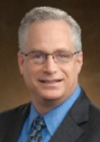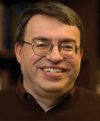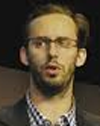Sunday
Welcome & Plenary
10:00am-10:50am
Hilton, Continental 5-6
Welcome
Stephen M. Robinson, President, INFORMS
Professor Emeritus, Industrial and Systems Engineering, University of Wisconsin-Madison
Candace A. Yano, General Chair, INFORMS Annual Meeting
Professor, University of California, Berkeley
Plenary
Market Design and the Economist as Engineer
Alvin E. Roth
Craig and Susan McCaw Professor of Economics, Stanford University
 Alvin E. Roth is the Craig and Susan McCaw Professor of Economics at Stanford University and the George Gund Professor Emeritus of Economics and Business Administration at Harvard. His research interests are in game theory, experimental economics and market design. He is one of the founders and designers of kidney exchange in the U.S., which helps incompatible patient-donor pairs find lifesaving compatible kidneys for transplantation. Roth shared the 2012 Nobel Memorial Prize in Economic Sciences. He shared the 1990 Lanchester Prize with Marilda Sotomayor for their book Two-Sided Matching: A Study in Game-Theoretic Modeling and Analysis, and was a 2014 Edelman Award finalist. He is a member of the National Academy of Sciences.
Alvin E. Roth is the Craig and Susan McCaw Professor of Economics at Stanford University and the George Gund Professor Emeritus of Economics and Business Administration at Harvard. His research interests are in game theory, experimental economics and market design. He is one of the founders and designers of kidney exchange in the U.S., which helps incompatible patient-donor pairs find lifesaving compatible kidneys for transplantation. Roth shared the 2012 Nobel Memorial Prize in Economic Sciences. He shared the 1990 Lanchester Prize with Marilda Sotomayor for their book Two-Sided Matching: A Study in Game-Theoretic Modeling and Analysis, and was a 2014 Edelman Award finalist. He is a member of the National Academy of Sciences.
Plenary
OMEGA RHO Distinguished Lecture
3:10pm-4:00pm
Hilton, Continental 5-6
Operations Research in Service of Drug & Addictions Policy: Lessons from and for the Discipline of Operations Research
Jonathan P. Caulkins, H. Guyford Stever Professorship of Operations Research and Public Policy, Carnegie Mellon University
I am an OR missionary. I have carried our tools and perspectives into the fields of drug policy and addiction. When traveling far afield, one often encounters opportunities to do good by applying what seem to be quite basic precepts back home, and one returns with a deeper understanding of one’s own culture and its strengths and weaknesses. That has certainly been true of my professional tour. I will share success stories – instances in which by virtue of being the only person thinking about an issue from the perspective of a math modeler, I was able to make fundamental contributions by doing analyses that anyone with training in OR would view as quite elementary. I will also try to share some insights into our disciplinary culture. Drug policy, like most policy domains, is inherently interdisciplinary. So I work with scholars from many disciplines. That experience has given me an appreciation of different disciplines’ strengths and limitations when grappling with messy unstructured problems. I firmly believe that diversity is essential to good decision making, including disciplinary diversity. But I am also interested in which disciplines’ graduates are leaders, not just members, of the teams that shape high-level and strategic decision making. I will close with some thoughts about how we might increase our discipline’s “market share” within those leadership roles.
 Jonathan P. Caulkins has been on the Heinz School faculty since 1990, with leaves of absence to be
co-director of RAND’s Drug Policy Research Center in Santa Monica, to found RAND’s Pittsburgh Office, and to teach at Carnegie Mellon’s campus in Doha, Qatar. At the Heinz School he was director of the Masters of Science in Public Policy and Management (MSPPM) program and served as interim Associate Dean for Faculty. Caulkins serves or has served on the editorial board of Management Science, Operations Research, Mathematical and Computer Modelling, the Journal of Drug Issues, Socio-Economic Planning Sciences, and I/S: A Journal of Law and Policy for the Information Society, and has refereed for over 85 different journals.
Jonathan P. Caulkins has been on the Heinz School faculty since 1990, with leaves of absence to be
co-director of RAND’s Drug Policy Research Center in Santa Monica, to found RAND’s Pittsburgh Office, and to teach at Carnegie Mellon’s campus in Doha, Qatar. At the Heinz School he was director of the Masters of Science in Public Policy and Management (MSPPM) program and served as interim Associate Dean for Faculty. Caulkins serves or has served on the editorial board of Management Science, Operations Research, Mathematical and Computer Modelling, the Journal of Drug Issues, Socio-Economic Planning Sciences, and I/S: A Journal of Law and Policy for the Information Society, and has refereed for over 85 different journals.
Monday
Keynote
10:00am-10:50am
Hilton, Continental 5
Honoring George B. Dantzig at 100: Remembering the Dantzig Century
Richard Cottle
Professor Emeritus, Dept. of Management Science and Engineering, Stanford University
George Bernard Dantzig was born on November 8, 1914, one hundred years and two days before the delivery of this talk and the cluster of two sessions in his honor. The sessions are intended to highlight the continuing impact of several areas to which he contributed during his remarkably productive lifetime. This talk will complement these sessions and recount some of the biographical side of this great figure to whom we owe so much.
Keynote
Reprise of 2014 Edelman Award-Winning Presentation
10:00am-10:50am
Hilton, Continental 6
U.S. Centers for Disease Control and Prevention
with Kid Risk Inc. - Polio Eradicators Use Integrated Analytical Models to Make Better Decisions
Kid Risk, Inc.: Kimberly Thompson,
Radboud J. Duintjer Tebbens
U.S. Centers for Disease Control and Prevention: Stephen L. Cochi, Mark A. Pallansch, Steven G. F. Wassilak
The U.S. Centers for Disease Control and Prevention, one of four spearheading partners of the Global Polio Eradication Initiative (GPEI) initiated a collaboration with Kid Risk, Inc. to develop and apply integrated analytical models to answer high-stakes policy questions related to managing the risks of polioviruses with
consideration of human health and economic outcomes. Over the last decade, the collaboration innovatively combined numerous operations research and management science tools, including simulation, decision and risk analysis, system dynamics, and optimization to help policy makers understand and quantify the
implications of their choices. These integrated modeling efforts helped motivate faster responses to polio outbreaks, leading to a global resolution and significantly reduced response time and outbreak sizes. Insights from the models also underpinned a global resolution to coordinate global cessation of the use of one of the two vaccines after wild poliovirus eradication (i.e., allowing continued use of the other vaccine as desired). Finally, the model results made the economic case for a continued commitment to polio eradication by quantifying the value of prevention and showing the health and economic outcomes associated with the alternatives. The work helped to raise the billions of dollars needed to support the completion of polio eradication that will prevent devastating cases of polio and enable realization of an estimated $40 to $50 billion in net benefits by the countries coved by the GPEI, while protecting the significantly larger net benefits enjoyed by the countries that stopped wild poliovirus transmission without support of the GPEI.
Keynote
3:10pm-4:00pm
Hilton, Continental 4
Panel on MOOCs: Just a Fad or Here to Stay?
Moderator: Martin Haugh, Co-Director of the Center for Financial Engineering (CFE), Department of IE & OR, Columbia University
Panelists: Dimitris Bertsimas, Professor of Operations Research and Statistics, Massachusetts Institute of Technology
Kay Giesecke, Associate Professor of Management Science & Engineering, Stanford University
Garud Iyengar, Professor of Industrial Engineering & Operations Research, Columbia University
Soulaymane Kachani, Professor of Industrial Engineering & Operations Research, Columbia University
Massive open online courses or MOOCs have been the subject of considerable recent media attention, with some claiming they will revolutionize education and others claiming they are over-hyped and just a passing fad. Perhaps a middle ground is more appropriate? In this panel discussion we will hear the views of academics in the OR/MS community who have been involved in the delivery and/or teaching of MOOCs within their respective universities. In addition to sharing their experiences, they will attempt to answer questions on the future development of MOOCs as well as their impact on education and the lives and careers of people in the OR community. A question and answer session
will be held at the end of the discussion.
Keynote
3:10pm-4:00pm
Hilton, Continental 5
Operating the Grid
Mark Rothleder, Vice President
Market Quality and Renewable Integration
California Independent System Operator Corporation
The ISO manages the flow of electricity across the high-voltage, long-distance power lines that make up 80 percent of California’s and a small part of Nevada’s power grid. The nonprofit public benefit corporation safeguards the economy and well-being of 30 million customers by "keeping the lights" on 24/7. The ISO facilitates a $10 billion electrical wholesale market. To efficiently and effectively manage the ISO wholesale market, the ISO utilizes sophisticated optimization
techniques to: simultaneously balance supply and demand, allocate transmission, commit generating resources and procure operating reserves. These optimization routines produce a reliable dispatch plan and locational marginal prices used for settlement every day for the next operating days 24 hours. Routines also execute in real-time every five minutes for next two hour dispatch horizon. As California fulfills important environmental polices related renewable resources and the reduction of greenhouse gas emissions from the electric energy sector, the ISO leverages its optimization routines to help successfully achieve policy objectives. Starting in the fall of 2014, the ISO’s energy imbalance market optimization routine is being offered to improve regional coordination, and provide economic benefits to interested neighboring balancing areas.
 Mark Rothleder is Vice President, Market Quality and Renewable Integration at the California Independent System Operator Corporation
and is leading the ISO’s renewable integration work. He has held several critical positions at the ISO after joining the grid
operator as one of its first employees in 1997. In spring 2009, he led a multifunctional team in designing and implementing market rules and software modifications related to the ISO’s Market Redesign and Technology Upgrade (MRTU). Rothleder holds a B.S. degree in Electrical Engineering from the California State University, Sacramento. He has taken post-graduate coursework in Power System Engineering from Santa Clara University and earned an M.S. in Information Systems from the University of Phoenix.
Mark Rothleder is Vice President, Market Quality and Renewable Integration at the California Independent System Operator Corporation
and is leading the ISO’s renewable integration work. He has held several critical positions at the ISO after joining the grid
operator as one of its first employees in 1997. In spring 2009, he led a multifunctional team in designing and implementing market rules and software modifications related to the ISO’s Market Redesign and Technology Upgrade (MRTU). Rothleder holds a B.S. degree in Electrical Engineering from the California State University, Sacramento. He has taken post-graduate coursework in Power System Engineering from Santa Clara University and earned an M.S. in Information Systems from the University of Phoenix.
Keynote
Reprise of the 2014 UPS George D. Smith Prize
3:10pm-4:00pm
Hilton, Continental 6
Massachusetts Institute of Technology
Georgia Perakis, William F. Pounds Professor
Donald Rosenfield, LGO Program Director, 1988-2014
The MIT Leaders for Global Operations (LGO), partnership among global operations companies and MIT, trains students for careers in operations and manufacturing. The two-year dual-degree program includes a six-month research internship, on-site labs and in-depth partner company visits as well as on-campus coursework and results in an MBA or MS from the MIT Sloan School of Management and an MS from one of seven MIT
engineering programs. During the internship, students work on an operations problem at one of 23 LGO
partner companies and write a master’s thesis based on their research and solutions. Courses in operations research and analytics are central to the LGO curriculum, which is based on the belief that deep knowledge of these fields is essential to achieving the best results
for industry. MIT faculty members at the forefront of operations research and engineering practice serve
as LGO teachers and thesis advisors.
Tuesday
Plenary
Philip McCord Morse Lecture
10:00-10:50am
Hilton, Continental 5
Statistics and Machine Learning via a Modern Optimization Lens
Dimitris Bertsimas, Professor of Operations Research and Statistics, Massachusetts Institute of Technology
Key problems of classification and regression in statistics and machine learning can naturally be formulated
as mixed integer optimization (MIO) models. While continuous optimization approaches has had a significant impact in statistics, discrete optimization has played a very limited role, primarily based on the belief formed in the 1970s and 1980s that MIO models are computationally intractable and not practically
relevant. While such beliefs were accurate then, in the last twenty-five years (1990-2014), algorithmic advances in integer optimization combined with hardware improvements have resulted in an astonishing 200
billion factor speedup in solving MIO problems. We develop discrete extensions of modern first order
continuous optimization methods to find high quality feasible solutions that we use as warm starts to a MIO solver that finds provably optimal solutions. We report results for the classical best subset selection problem in linear regression currently solved by LASSO heuristically, least quantile regression, factor analysis and optimal CART. In all cases we demonstrate that the solutions found by modern optimization methods outperform the classical approaches in developing more interpretable models and providing stronger predictive power. This body of work collectively suggests that the belief widely held in statistics and machine learning that MIO is not practically relevant for statistics applications needs to be revisited.
 Dimitris Bertsimas is the Boeing Leaders for Global Operations Professor and the Co-Director of the Operations Research Center at the Massachusetts Institute of Technology. His research interests include analytics and their applications, especially in a variety of industries with particular emphasis in healthcare. He has co-authored more
Dimitris Bertsimas is the Boeing Leaders for Global Operations Professor and the Co-Director of the Operations Research Center at the Massachusetts Institute of Technology. His research interests include analytics and their applications, especially in a variety of industries with particular emphasis in healthcare. He has co-authored more
than 150 scientific papers and has co-authored three graduate level textbooks. He is a member of the National Academy of Engineering, has received several research awards including the Farkas prize (2008), the Erlang prize (1996), the SIAM prize in optimization (1996), the Bodossaki prize (1998) and the Presidential Young Investigator award (1991-1996).
Keynote
IFORS Distinguished Lecture
3:10pm-4:00pm
Hilton, Continental 5
Credit Where Credit is Due: Lessons for O.R. Modelling from the Global Financial Crisis
Lyn Thomas, Professor of Management Science, University of Southampton
Credit scoring, the operations research and statistical models used to assess the default risk in consumer lending, has proved essential to the growth in consumer credit experienced in the last fifty years. It has also seen the development of methodologies and ways of model assessment that have proved fundamental in data mining applications from prison parole to intensive care treatment. It is also an early example of the use of “quite big data.” Initially credit scoring was used to ensure consistent and optimal accept/reject decisions when new customers requested loans. The approach was extended to assess the default risk of existing
customers; to assess whether customers would pay off their loan early or move to other lenders; and to risk-based pricing. The advent in 2006 and 2013 of the Basel II and Basel III banking regulations meant scoring models became essential in setting the capital requirements of banks and this has introduced new areas of research. Yet credit scoring together with the models used by rating agencies to assess the default risk of portfolios of consumer loans are highlighted in the debate on the causes of the subprime mortgage crash and the subsequent global financial crisis. Identifying the performance of these models during this period leads to a number of lessons which are relevant to Operations Research modelling in many areas. These include whether models should be publically available and the need to recognize when the objectives of the model are no longer in line with those of the real problem.
 Lyn Thomas has been Professor of Management Science at the University of Southampton since 2000. He was Professor of Management Science at the University of Edinburgh from 1985-2000. He served as President of the Operational Research Society (1994-1995). Thomas is a fellow of the Royal Society of Edinburgh 1992, member of the EPSRC College (since 1995), and previously a member of the EPSRC Mathematics Committee and Chairman of the Operational Research Panel. He was a member of DSAC Operations Analysis Board (2001-2012).
Lyn Thomas has been Professor of Management Science at the University of Southampton since 2000. He was Professor of Management Science at the University of Edinburgh from 1985-2000. He served as President of the Operational Research Society (1994-1995). Thomas is a fellow of the Royal Society of Edinburgh 1992, member of the EPSRC College (since 1995), and previously a member of the EPSRC Mathematics Committee and Chairman of the Operational Research Panel. He was a member of DSAC Operations Analysis Board (2001-2012).
Keynote
3:10pm-4:00pm
Hilton, Continental 6
The Google Driverless Car
Anthony Levandowski, Project Leader, Google
The Google Self-Driving Car is a project by Google that involves developing technology for autonomous cars. The software powering Google's cars is called Google Chauffeur. Lettering on the side of each car identifies it as a "self-driving car." The talk will describe the status of the project and highlight the underlying technology and recent accomplishments.
 Anthony Levandowski is a tech lead for Google's self-driving car project, where he oversees laser development and legislative efforts. He joined Google in 2007 to launch Street View, a technology featured in Google Maps and Google Earth, which provides panoramic views from positions all over the world. After building Street View, He spearheaded the effort to mine Street View imagery and create the road network database that powers Google Maps, enabling for the first time free turn-by-turn navigation on all mobile phones. As a graduate student at the University of California, Berkeley, Levandowski led the team that created the world's first autonomous motorcycle, Ghostrider, which competed in a 2005 contest sponsored by the military's DARPA.
Anthony Levandowski is a tech lead for Google's self-driving car project, where he oversees laser development and legislative efforts. He joined Google in 2007 to launch Street View, a technology featured in Google Maps and Google Earth, which provides panoramic views from positions all over the world. After building Street View, He spearheaded the effort to mine Street View imagery and create the road network database that powers Google Maps, enabling for the first time free turn-by-turn navigation on all mobile phones. As a graduate student at the University of California, Berkeley, Levandowski led the team that created the world's first autonomous motorcycle, Ghostrider, which competed in a 2005 contest sponsored by the military's DARPA.
Wednesday, October 9
Keynote
2014 Daniel H. Wagner Prize Winner
Announcement and Reprise
10:00am-10:50am
Hilton, Continental 5
Daniel H. Wagner earned his PhD in mathematics from Brown University in 1951. He began his career in the US Navy’s Operations Evaluation Group (OEG) at the Pentagon, where he worked on operations research for naval warfare. In 1963, he created the firm of Daniel H. Wagner Associates, Inc., which is still in existence today. During his years as president and principal owner of Wagner Associates, Dan brought many high-quality mathematicians into the operations research community. This led to significant advances in the firm’s fields of endeavor and delivery of significant applications to the Navy, Coast Guard, and other clients; many of these applications are still in service today. After retirement from his eponymous company, Dan Wagner continued his commitment to the field of operations research, serving in various teaching and research positions with the US Naval Postgraduate School and the US Naval Academy. He was an active member of ORSA, and then INFORMS, for more than 40 years.

 INFORMS
INFORMS